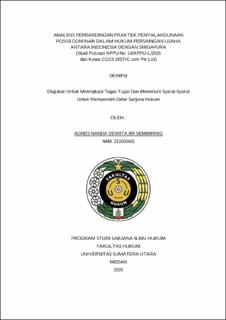Analisis Perbandingan Praktek Penyalahgunaan Posisi Dominan Dalam Hukum Persaingan Usaha Antara Indonesia Dengan Singapura (Studi Putusan Kppu No. 14/KPPU-L/2015 Dan Kasus CCCS SISTIC.com Pte Ltd)
Comparative Analysis Of The Abuse Of Dominant Position In Competition Law Between Indonesia And Singapore (Study Of KPPU Ruling Number 14/KPPU-L/2015 And CCCS Case SISTIC.com Pte Ltd)

Date
2025Author
Sembiring, Agnes Nanda Dewita Br
Advisor(s)
Sirait, Ningrum Natasya
Robert
Metadata
Show full item recordAbstract
Economic activities cannot be separated in human life. Economic activities are all activities carried out by humans to meet the diverse and unlimited needs of life, including the need for goods and services. To meet these human needs, business actors try to dominate the market by competing in order to provide the best products or services to their consumers. Competition requires rules because market mechanisms do not always work well.
Indonesia and Singapore already have laws governing unfair business competition. The laws of the two countries both regulate the abuse of dominant position. This thesis will analyze business competition law, especially in the practice of abuse of dominant position by referring to knowledge related to business competition law, instruments for the practice of abuse of dominant position, and examples of cases of abuse of dominant position that have occurred from each country. The research method used is a normative legal method with a comparative study approach. This research is descriptive in nature by describing legal phenomena obtained from literature study.
There are differences and similarities in the application of competition law between these two countries, especially in the practice of abuse of dominant position in Indonesia and Singapore in terms of laws, guidelines, and cases that have occurred in these two countries. Differences in competition law include the legal system, legal subjects, prohibited practices and sanctions stipulated in the law. In the regulation on abuse of dominant position, the differences include the characteristics of the dominant legal subject, the method of determining the relevant market, and the description of practices that are classified as abuse of dominant position. There are also some similarities in the regulation of competition law and abuse of dominant position such as the duties and authorities of law enforcement institutions, the definition of dominant position, and the concept used to categorize the subject of competition law as abusing a dominant position.
Collections
- Undergraduate Theses [3141]
